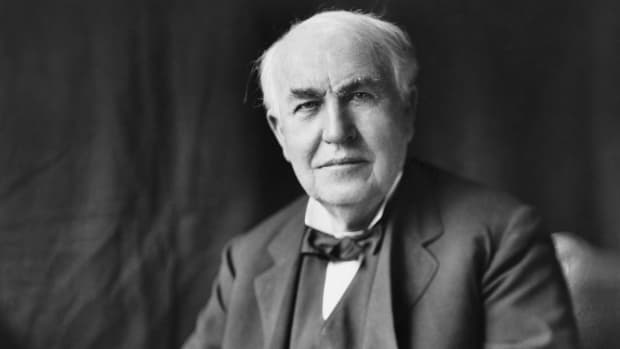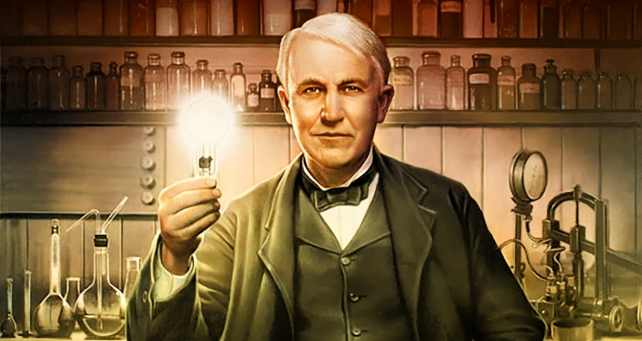Thomas Edison: The Wizard of Menlo Park
 Thomas Alva Edison, often referred to as the Wizard of Menlo Park, was an American inventor and businessman who profoundly influenced the modern world with his creations. Born on February 11, 1847, in Milan, Ohio, Edison's relentless pursuit of innovation led to the invention of numerous devices that revolutionized industry, communication, and daily life. Throughout his lifetime, he obtained over 1,000 patents, making him one of the most prolific inventors in history.
Thomas Alva Edison, often referred to as the Wizard of Menlo Park, was an American inventor and businessman who profoundly influenced the modern world with his creations. Born on February 11, 1847, in Milan, Ohio, Edison's relentless pursuit of innovation led to the invention of numerous devices that revolutionized industry, communication, and daily life. Throughout his lifetime, he obtained over 1,000 patents, making him one of the most prolific inventors in history.
Edison's early life was marked by curiosity and an insatiable desire to learn. His formal education was limited, as he only attended school for a few months. However, his mother, Nancy, a former teacher, recognized his potential and encouraged his intellectual development at home. Edison credited his mother with instilling in him a love of learning that would shape his future endeavors.
At the age of 12, Edison began working as a newsboy on the Grand Trunk Railroad, where he conducted chemical experiments in a makeshift laboratory onboard. Despite facing setbacks and challenges, including partial deafness from a young age, Edison remained undeterred in his pursuit of knowledge and innovation.
In 1868, Edison secured his first patent for the electric vote recorder, which was never successfully commercialized. However, it marked the beginning of his prolific career as an inventor. Throughout the 1870s and 1880s, Edison's inventions ranged from improvements to the telegraph and stock ticker to the creation of the phonograph, a device capable of recording and playing back sound. Perhaps Edison's most notable invention was the practical and commercially viable incandescent light bulb. In 1879, after countless experiments and iterations, Edison successfully produced a bulb that could provide long-lasting illumination. This achievement not only revolutionized the way people lived and worked but also laid the foundation for the modern electrical industry.
Perhaps Edison's most notable invention was the practical and commercially viable incandescent light bulb. In 1879, after countless experiments and iterations, Edison successfully produced a bulb that could provide long-lasting illumination. This achievement not only revolutionized the way people lived and worked but also laid the foundation for the modern electrical industry. Edison's contributions extended beyond individual inventions; he played a significant role in establishing the world's first industrial research laboratory. In 1876, he established the Menlo Park laboratory in New Jersey, which became a hotbed of innovation and experimentation. It was here that Edison and his team developed numerous groundbreaking inventions, earning him the nickname the "Wizard of Menlo Park."
Edison's contributions extended beyond individual inventions; he played a significant role in establishing the world's first industrial research laboratory. In 1876, he established the Menlo Park laboratory in New Jersey, which became a hotbed of innovation and experimentation. It was here that Edison and his team developed numerous groundbreaking inventions, earning him the nickname the "Wizard of Menlo Park."
One of the key principles that guided Edison's approach to innovation was his belief in the power of persistence and hard work. He famously remarked, "Genius is one percent inspiration, ninety-nine percent perspiration." Edison understood that success often required relentless effort and a willingness to persevere in the face of failure.
Throughout his career, Edison faced numerous challenges and setbacks. Many of his experiments failed, and he encountered criticism and skepticism from those who doubted his ideas. However, Edison viewed each setback as an opportunity to learn and improve. He embraced failure as an essential part of the creative process, famously stating, "I have not failed. I've just found 10,000 ways that won't work." Edison's impact extended far beyond the realm of invention; he was also a shrewd businessman and entrepreneur. He founded the Edison General Electric Company (now General Electric) in 1890, which played a pivotal role in the development and commercialization of electrical technology.
Edison's impact extended far beyond the realm of invention; he was also a shrewd businessman and entrepreneur. He founded the Edison General Electric Company (now General Electric) in 1890, which played a pivotal role in the development and commercialization of electrical technology.
In addition to his work in electricity and communication, Edison was also deeply interested in improving the quality of life through innovation. He developed the first commercially successful motion picture camera, the kinetograph, and the kinetoscope, a device for viewing moving pictures. These inventions laid the groundwork for the modern film industry, transforming entertainment and storytelling.
Despite his immense success, Edison remained humble and grounded, never forgetting the importance of giving back to society. He was a strong advocate for education and believed in the power of invention to improve the lives of ordinary people. In his later years, he focused on projects aimed at enhancing education and promoting scientific research.
Thomas Edison's legacy continues to inspire innovators and inventors around the world. His relentless pursuit of innovation, coupled with his unwavering determination and work ethic, serves as a testament to the power of human ingenuity. Edison's impact on the modern world is immeasurable, and his contributions continue to shape the way we live, work, and communicate today. Edison's influence extended beyond the confines of his laboratory and business ventures; he was also deeply involved in shaping public perception and policy regarding technology and innovation. As a prominent figure in the late 19th and early 20th centuries, he used his platform to advocate for the advancement of science and technology for the betterment of society. Edison believed that technology had the power to improve people's lives and enhance human progress.
Edison's influence extended beyond the confines of his laboratory and business ventures; he was also deeply involved in shaping public perception and policy regarding technology and innovation. As a prominent figure in the late 19th and early 20th centuries, he used his platform to advocate for the advancement of science and technology for the betterment of society. Edison believed that technology had the power to improve people's lives and enhance human progress.
One of the areas where Edison made significant contributions was in the field of electrical power distribution. His development of the first practical incandescent light bulb paved the way for the widespread adoption of electric lighting, which transformed cities and towns around the world. Edison's vision of a future powered by electricity laid the groundwork for the modern electrical grid, which continues to power homes, businesses, and industries to this day.
In addition to his work on electric lighting, Edison was also instrumental in the development of other electrical technologies, including the electric generator and distribution system. He recognized the importance of creating an infrastructure that could efficiently generate and distribute electricity to meet the growing demands of society. Edison's contributions to electrical engineering laid the foundation for the modern power industry, shaping the way we generate, transmit, and consume electricity.
Edison's impact on communication technology was equally profound. His invention of the phonograph revolutionized the recording and playback of sound, opening up new possibilities for entertainment, education, and communication. The phonograph paved the way for the development of the modern music industry and provided people with the ability to preserve and share audio recordings for the first time in history.
Furthermore, Edison's work on the telegraph and stock ticker helped to revolutionize the way information was transmitted and disseminated. His improvements to these technologies made it possible for messages to be sent and received more quickly and efficiently, laying the groundwork for the modern telecommunications industry.
One of the hallmarks of Edison's approach to innovation was his emphasis on practicality and commercial viability. Unlike some inventors who focused solely on theoretical advancements, Edison was deeply committed to creating inventions that had real-world applications and could be brought to market. He understood the importance of not only inventing new technologies but also finding ways to make them accessible and affordable to the general public.:max_bytes(150000):strip_icc()/ThomasEdison-58b82fee3df78c060e6505b7.jpg) Throughout his career, Edison demonstrated a remarkable ability to identify opportunities for innovation and capitalize on them. Whether it was developing new technologies or improving existing ones, he constantly sought ways to push the boundaries of what was possible. Edison's entrepreneurial spirit and business acumen were instrumental in turning his inventions into successful commercial ventures.
Throughout his career, Edison demonstrated a remarkable ability to identify opportunities for innovation and capitalize on them. Whether it was developing new technologies or improving existing ones, he constantly sought ways to push the boundaries of what was possible. Edison's entrepreneurial spirit and business acumen were instrumental in turning his inventions into successful commercial ventures.
In addition to his technical skills, Edison was also a master marketer and promoter. He understood the importance of public perception and worked tirelessly to cultivate his image as a visionary inventor and businessman. Edison's knack for self-promotion helped to generate interest and excitement around his inventions, ensuring their success in the marketplace.
Despite his many achievements, Edison's career was not without controversy. He was known for fiercely defending his patents and often engaged in legal battles to protect his intellectual property rights. Some critics accused him of being overly litigious and of stifling innovation by monopolizing certain industries. However, others argued that his aggressive defense of his patents was necessary to incentivize innovation and protect inventors' rights.
In conclusion, Thomas Edison's contributions to science, technology, and society are immeasurable. His inventions have had a profound and lasting impact on the world, shaping the way we live, work, and communicate. Edison's legacy serves as a reminder of the power of human ingenuity to drive progress and change the world for the better. As we continue to reap the benefits of his inventions, we are reminded of the enduring legacy of the Wizard of Menlo Park.













































